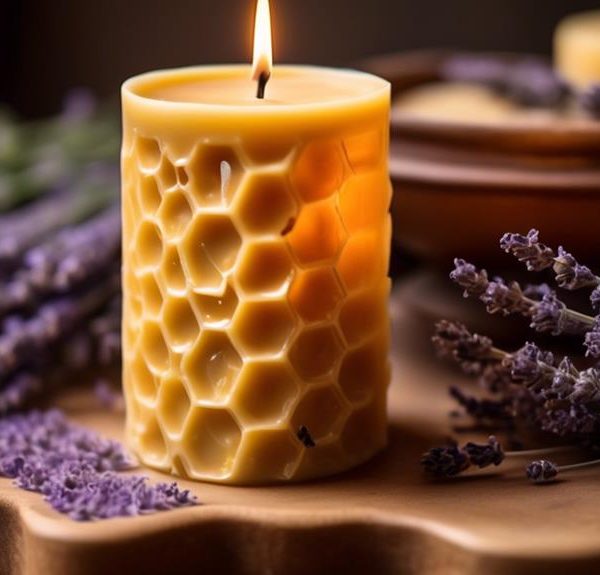Feeding bees isn't always necessary, discover surprising factors dictating when and what to offer these essential pollinators.
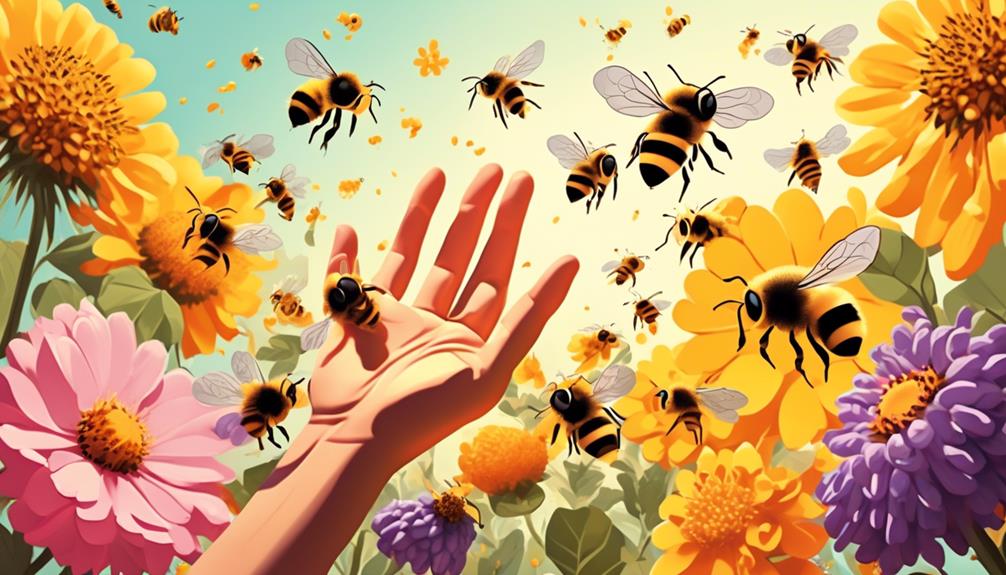
Do You Have to Feed Bees?
Imagine you're a new beekeeper, and you've just set up your first hive. You're probably wondering if you need to feed your bees.
After all, wild bees seem to get by just fine without any human intervention. It's not as straightforward as you might think, though.
Bees' nutritional needs can vary greatly depending on factors such as the time of year, the health of the colony, and local environmental conditions. So, while it's not always necessary to feed bees, there are times when it can be beneficial.
But how do you know when and what to feed them?
The answers to these questions may surprise you.
Key Takeaways
- Bees require a balanced diet of proteins, carbohydrates, lipids, vitamins, and minerals for their overall health and productivity.
- Beekeepers have a crucial role in ensuring bees have access to diverse food sources and managing hive health.
- Feeding bees varies with the seasons, and supplemental feeding may be necessary in fall and winter to prevent starvation.
- Overfeeding bees can have negative consequences such as decreased brood production and swarming behavior, so alternative support methods like planting native plants and providing clean water and safe habitats are important for bee health.
Understanding Bee Nutrition Needs
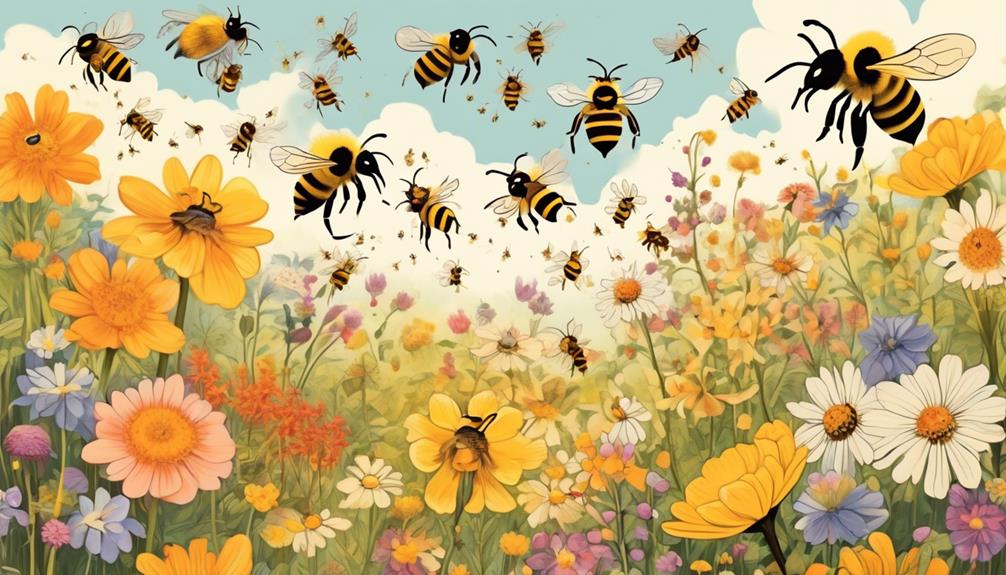
To effectively feed your bees, you'll need to thoroughly understand their complex nutritional needs.
Bees require a balanced diet of proteins, carbohydrates, lipids, vitamins, and minerals. Proteins are essential for growth and development, particularly for the larvae. The primary source of protein for bees is pollen, which also provides essential amino acids.
Carbohydrates, mainly in the form of sugars from nectar, serve as the primary energy source. Bees store these sugars as honey which they use to sustain themselves during periods of scarcity.
Lipids, although a minor part of their diet, are vital for producing hormones and building cell membranes.
Vitamins and minerals, though required in small amounts, are crucial for metabolic activities and maintaining bee health. These are usually obtained from pollen, nectar, and water. For instance, potassium helps in enzyme activation and calcium aids in larval development.
Understanding these nutritional needs is essential because malnutrition can severely impact bee health and productivity. It can disrupt their growth, reproduction, and resistance to diseases and parasites.
The Role of Beekeepers
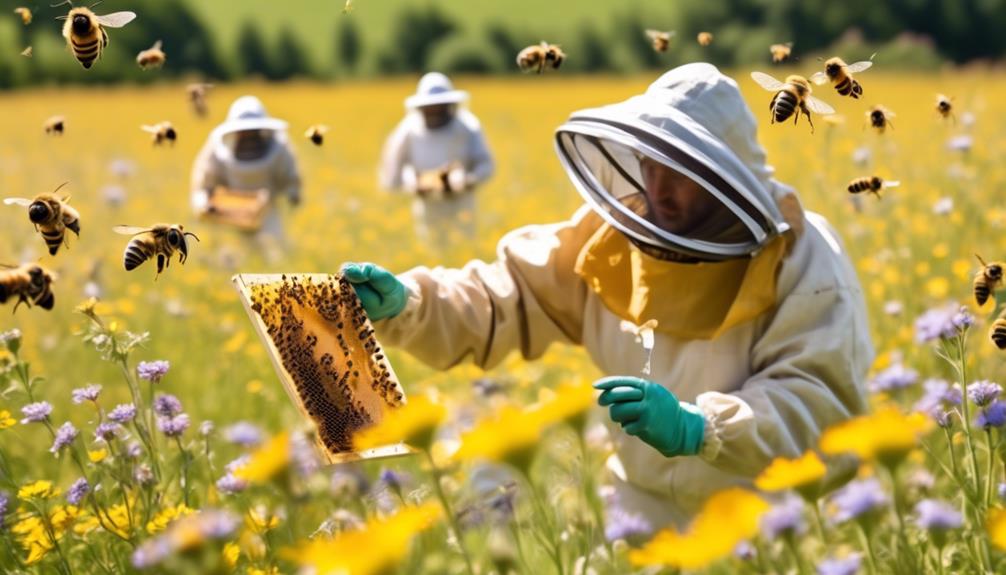
Given the importance of nutrition in maintaining a robust and productive bee colony, your role as a beekeeper isn't only to ensure they've access to diverse food sources but also to provide supplemental feeding when natural sources are insufficient. It's a delicate balance, requiring careful observation, and informed decision-making.
You've to be aware of the nutritional needs of bees, which change with the seasons. During nectar flow, for example, bees collect their food, but in winter or drought, they're reliant on stored food and may require artificial feeding. You'll need to provide a balanced diet, including carbohydrates, proteins, lipids, vitamins, and minerals. Sugar syrup and pollen substitutes are commonly used supplements.
It's also your responsibility to manage hive health, which is directly linked to nutrition. Poor nutrition can lead to weakened immunity against diseases and pests. Regularly inspect your hives, looking for signs of stress or disease. You should consider factors such as colony size, brood pattern, and amount of stored food.
Feeding Bees in Different Seasons
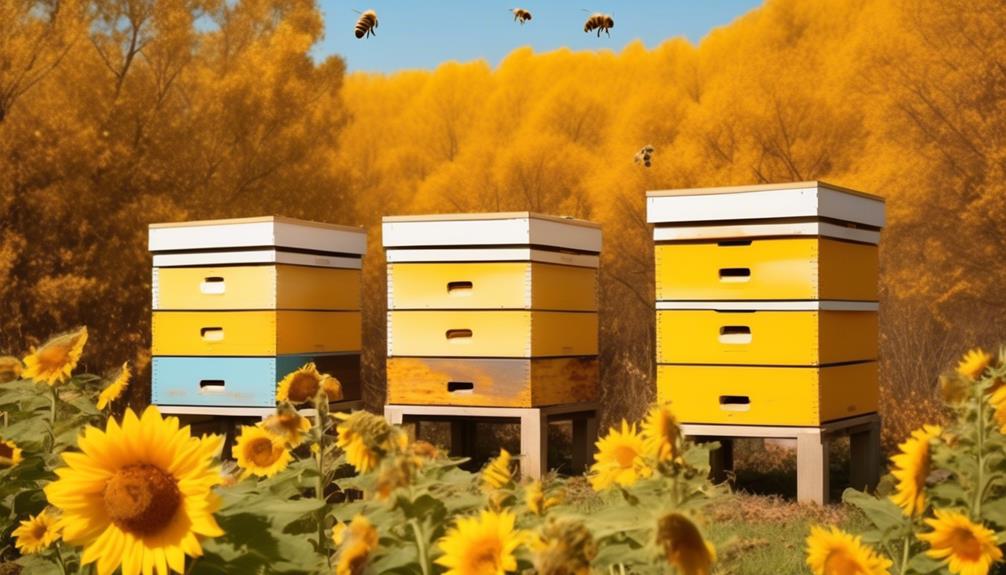
Understanding how to feed your bees throughout the changing seasons is a crucial aspect of successful beekeeping, as their dietary needs and available food sources can significantly fluctitate throughout the year. In the spring and summer, bees are usually self-sufficient, sourcing nectar and pollen from blooming plants. However, you'll need to monitor their food stores regularly to ensure they're adequately stocked.
In the fall, as natural sources dwindle, you'll need to supplement their diet, usually with a 2:1 sugar to water ratio syrup. This thicker syrup encourages the bees to store it for the colder months. Throughout winter, they'll rely on these stores to survive. If you notice these stores depleting quickly, a fondant or sugar candy might be necessary to prevent starvation.
Extreme weather conditions can also impact food availability. After prolonged periods of rain or drought, you might need to provide supplemental feeding to help your bees thrive.
Always remember, a well-fed hive is a productive and healthy hive. With careful observation and proactive management, you can ensure your bees have the nutrition they need, whatever the season.
Risks of Overfeeding Bees

While ensuring your bees have enough food is vital, it's equally important to be aware that overfeeding can pose its own set of challenges. Overfeeding your bees can lead to a condition known as 'honey-bound'. In this state, the bees fill all available comb space with food, leaving no room for the queen to lay eggs, resulting in decreased brood production.
Moreover, an overabundance of food can also cause swarming behavior. When the hive becomes congested due to excess food, the bees may decide to split and form a new colony. This can result in a significant reduction of your bee population, affecting overall productivity.
Further, feeding bees too much, particularly with sugar syrup, can lead to unhealthy colonies. It's crucial to remember that while sugar provides energy, it doesn't offer the essential nutrients that pollen does. Over-reliance on this substitute can lead to malnourished bees, susceptible to diseases and pests.
Alternative Ways to Support Bees
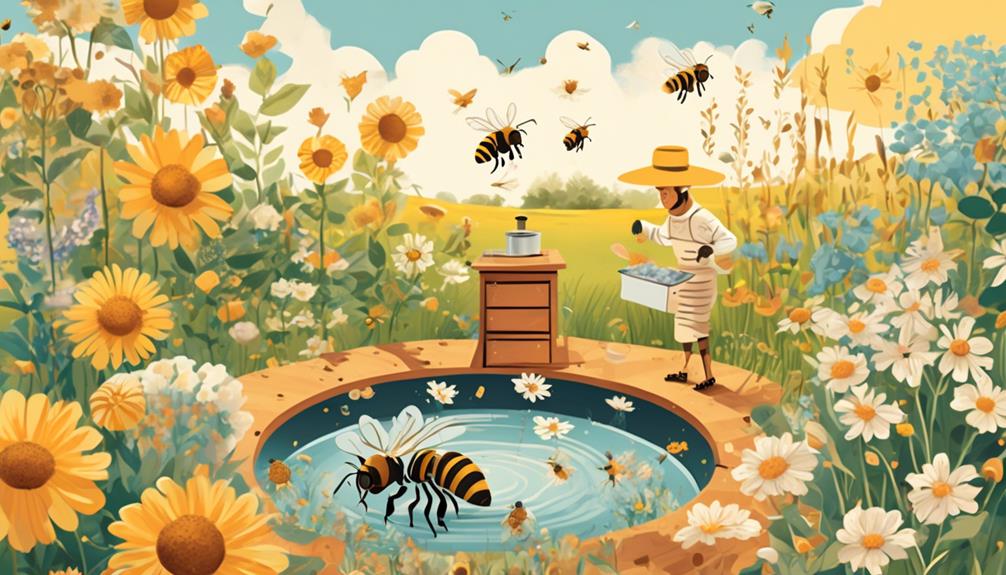
Beyond providing your bees with food, there are several alternative methods you can employ to support their health and productivity.
Firstly, you could consider planting a diverse range of native plants in your garden. Bees thrive on a varied diet, and this promotes healthier bee populations. You'll want to aim for a mix of plants that bloom at different times, ensuring a constant food source for your bees.
Furthermore, you should ensure your bees have a clean, easily accessible water source. Bees need water to cool their hives, dilute honey for feeding, and for personal hydration. You can provide this by having a shallow dish or birdbath filled with fresh water.
Another key support method is the provision of a safe habitat. This could be an open-faced bee hotel for solitary bees or a hive for colony bees. Also, refrain from using pesticides in your garden, as they're detrimental to bees' health.
Lastly, regular hive inspections can help you monitor your bees' health and detect any issues early. Look out for signs of disease or pest infestation, and act promptly to address these problems. By implementing these methods, you can support your bees beyond mere feeding.
Frequently Asked Questions
What Types of Bees Require Feeding and Which Ones Don't?
You don't always need to feed bees. Honeybees, especially new colonies and overwintering bees, often require supplemental feeding. However, wild bees like bumblebees and solitary bees generally find their own food.
It's crucial to know your specific bee species' needs. Remember, overfeeding can discourage natural foraging. Feeding should only be a support, not a substitute for a natural diet.
How Can You Tell if a Bee Is Hungry or Malnourished?
You can't directly tell if a bee is hungry, but there are signs of a struggling hive. If it's late winter and there's not enough honey stored, the hive might be malnourished.
Starving bees may also exhibit erratic behavior, such as foraging in cold or rainy weather.
Observing the health of the hive, including the queen's productivity and the presence of disease, can further indicate malnutrition.
It's always best to consult an expert.
Are There Specific Foods or Substances That Are Harmful to Bees?
Yes, there are certain substances that can harm bees. Pesticides are notably dangerous, often leading to bee deaths. Some artificial sweeteners, like xylitol, can also be harmful.
It's important that you're cautious about what you're exposing bees to. Even certain types of flowers can negatively affect bees, like rhododendrons, which produce a toxic nectar.
Always research and ensure you're creating a safe environment for these vital pollinators.
How Do Bees Contribute to the Ecosystem and Why Is Their Survival Important?
You're right to wonder about bees' role in our ecosystem. They're crucial pollinators, transferring pollen and seeds from one flower to another, fertilizing plants so they can grow and produce food. Without bees, our food supply would drastically diminish.
They're also key indicators of environmental health. Bees' survival is vital because they help maintain balance and diversity in nature.
Can Feeding Bees Disrupt Their Natural Foraging Behavior?
Yes, feeding bees can disrupt their natural foraging behavior. When you provide them with sugar water or other substitutes, they may become reliant on these sources. This could lead to a decrease in their natural foraging activities, potentially impacting the pollination process.
It's best to let bees gather their own food from plants, ensuring a diverse diet and promoting healthy ecosystems.
Conclusion
In conclusion, feeding bees is important, especially for beekeepers, to supplement their diet in different seasons. However, it is important to be cautious of overfeeding, as it can have risks associated with it.
To strike a balance, it is advisable to explore alternative ways of supporting bees, such as planting bee-friendly flowers. By doing so, you can provide them with natural sources of nutrition.
Always keep in mind that understanding the nutritional needs of bees is crucial in keeping them healthy and happy. Your role as a beekeeper in their well-being is significant, so it is important to feed them responsibly.

